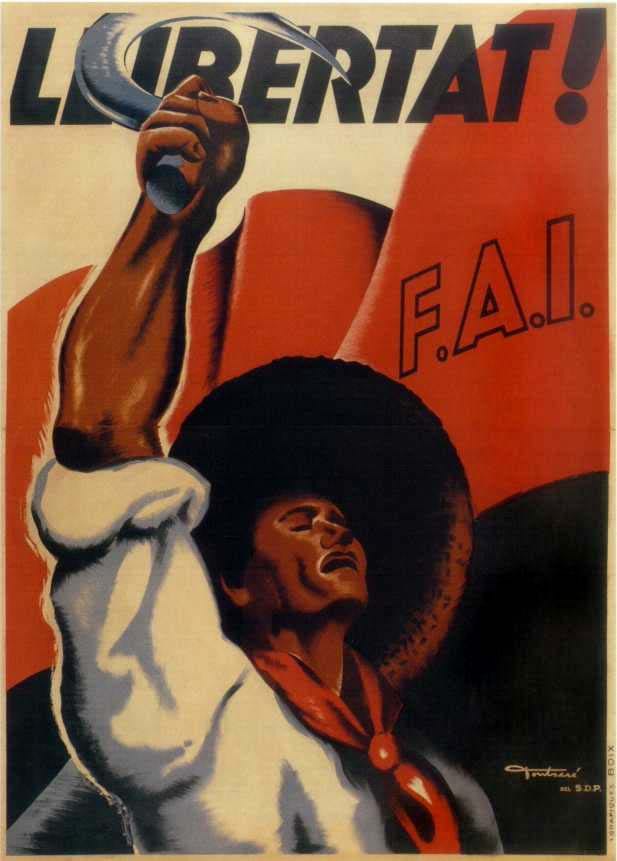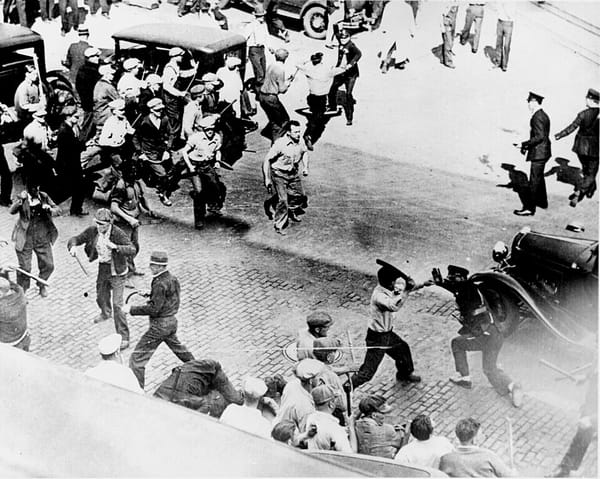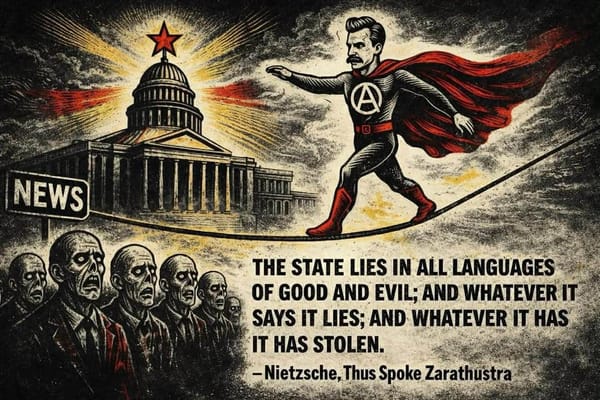Anarcho-Syndicalist FAQ

Anarcho-Syndicalism is the main revolutionary strategy of the historical Anarchist movement. The oldest Anarchist international organization: International Workers' Association, is Anarcho-Syndicalist. Anarcho-Syndicalism was the framework in which Anarchism achieved its biggest political success in the form of the social revolution which took place during the Spanish Civil War from 1936-39. In this article I'll address various questions that are often asked about Anarcho-Syndicalism to provide readers with a better understanding of this long-standing approach to revolutionary politics.
Question: Do Anarcho-Syndicalists call for a society ran by trade unions?
Answer: No. Anarcho-Syndicalism is not a kind of society; it is a revolutionary strategy for the transition from capitalism to Anarchism. Anarcho-Syndicalists are usually libertarian communists, meaning that the society Anarcho-Syndicalists are trying to achieve is a society in which free associations of producers plan social production and allocate social wealth according to the needs of the human community which is achieved not through the seizure of centralized political power (as advocated by most Marxist communists), but by decentralization of society's institutions through self-organization of the revolutionary working class. Anarcho-Syndicalists do not limit ourselves to labor unions with trade defined membership, but aim to build labor unions, tenant unions, cooperatives, and cultural working-class associations which embrace all workers from all trades. The point of revolutionary unions in the Anarcho-Syndicalist picture is to be worker-controlled institutions of class struggle which will eventually seize control of production and society. At that point the unions do not stay around to run society, but because the class struggle has been won and class divisions have been eradicated the unions naturally transform themselves into free producers' associations for the organization of the new society.
Question: Why do Anarcho-Syndicalists advocate self-management?
Answer: Self-management for Anarcho-Syndicalists is participatory and freely associated organization of social affairs and productive activity. Anarchists think that the fundamental problem with capitalism, the state, and class society is social domination in which the activity of one class of people is controlled, directed, policed, and prescribed by a ruling class. In order to break down class domination Anarchists propose that the laboring classes of capitalist society take control of social production and the wider organization of society and run it themselves on a horizontal basis.
Question: Don't Anarcho-Syndicalists just want self-managed capitalism?
Answer: No. Anarcho-Syndicalists want libertarian, or Anarchist Communism. As described by theorists such as Peter Kropotkin and Isaac Puente libertarian communism would be a society without social classes, without the state, without private property, and without the market. Instead of producing to buy and sell free producers associations would produce to meet social needs directly through a rational plan of social production. Thus, self-management in a libertarian communist society would not be worker self-management, but the self-management of the classless human community. Worker self-management is reserved for the institutions of class struggle in transition to the communist society such as the revolutionary unions.
Question: Why do Anarcho-Syndicalists emphasize class struggle?
Answer: Class societies such as capitalism are derived from class domination in which a certain section of the population monopolizes control over social production and the social wealth it produces and with which it produces. Thus, in class societies all social struggles are determined by class domination which constrains how human beings access the very resources they require to survive. In capitalist society the oppressed class is the working class which is dispossessed of ownership over the means of production and thus must sell its ability to perform labor to those who own productive enterprises in order to receive wages and salaries that allow them to buy the means of life. Capitalism brings the oppressed working class into productive association within a globalized and technologically sophisticated division of labor so that workers are subordinated to what Marx called socially necessary labor time (the average time it takes to produce a given commodity for the market). In so doing it also unites workers with a common set of interests in fighting their own exploitation and domination (which is why workers come together to organize for better pay, conditions, and benefits). The logical end of these interests toward which workers inch in every class struggle is the expropriation of social production and social wealth by the working class and its rational organization to satisfy the common needs of humanity.
Question: Why do Anarcho-Syndicalists reject the state?
Answer: Historically there has been a division between Anarchists and other communists over the question of political power where Marxists have usually advocated the organization of political parties to take state power and use it to affect the transition from capitalism to communism. Anarchists rejected this idea because Anarchists oppose the state and organizational centralism. The basic reason Anarchists oppose the state is that the state is a top down, bureaucratic, and coercive organization. The state cannot exist without social domination and in so far as the state maintains itself it maintains social domination. The point of Anarchism (and communism more broadly) is to create a society without social domination in which human relationships take the form of free and equal associations, so Anarchists argue that instead of taking state power the revolutionary movement needs to destroy the state.
Marxists have tried to counter this argument by saying that since communism can only be affected by revolutionary working-class control of society that the working class needs to take power as a ruling class and thus elevate itself to the seat of state power and use that power to dominate, conquer, and extinguish counterrevolutionary forces. Thus, only when the counterrevolution has been extinguished can the state wither away into the community of free producers. Marx himself, however, provides a refutation of this argument. Marx and his colleague Engels theorized that the revolutionary dictatorship of the proletariat implied the destruction of the hierarchical and coercive mechanisms of the state apparatus since worker control of society implies the control of society by the oppressed majority, rather than a coercive, bureaucratic, and top-down entity.
By the same token Anarchists have opposed the organizational centralism embraced by many Marxists where the revolutionary movement is supposed to be subordinated to one central decision-making power such as a central committee, or political party. Anarchists argue that organizational centralism is incompatible with the revolutionary movement's goals because control of the movement by a center of power displaces the collective control of the movement by the workers' themselves which would be required for revolutionary working-class control of society. While Marxists have been known to organize political parties since their goal is the seizure of state power, Anarchists reject that any special political organization that subordinates the movement to its program has a place in the revolutionary project since such subordination is impossible without organizational centralism and ultimately the conquest of state power. Anarcho-Syndicalists insist instead that the workers carry out the revolutionary struggle within worker-controlled organizations of class struggle open to the entire working class.
Question: Why do Anarcho-Syndicalists reject elections?
Answer: People living in capitalist democracies have been trained by political and social institutions to think that the most effective form of political engagement is voting, electoral campaigning, and running for office. Anarcho-Syndicalists deny this, in fact Anarcho-Syndicalists think that these are the least effective methods of political engagement. Capitalist democracies are still, in Marx's terms, dictatorships of the bourgeoisie. The state can be influenced by electoral coalitions and voter bases, but the point of the state regardless is to enforce the class domination of the capitalist class over the working class and develop itself within the capitalist world-economy which is maintained through a world division of labor which is hierarchical and concentrates society's benefits at the top. Thus, elections are far more of a device for engineering public consent to class domination than a device for reducing, or curbing class domination. Anarcho-syndicalists intervene in politics through class struggles instead of elections which have the ability to curb class domination by acting as an obstacle to the ideological and coercive mechanisms of that domination.
Question: What is the difference between the social contract in liberalism and the federalism advocated by Anarcho-Syndicalists?
Answer: Social contract theorists in the liberal tradition such as Rousseau and Locke thought that the point of the state was to ensure liberty for all by enforcing an unspoken contract which individuals supposedly agreed to by participating in society's institutions, which essentially says that all shall have liberty except when the exorcise of liberty interferes with the exorcise of the liberty of others. Anarchists reject the social contract because Anarchists do not think that liberty is safeguarded through the intervention of a central authority enforcing adherence to a tacit social agreement. Instead, Anarchists think freedom is the result of participatory control of social wealth and the voluntary exercise thereof. Therefore, there can be no central authority which secures liberty since that central authority would be premised on social domination required to subject individuals to the center of power.
Instead of central political authorities and social contracts Anarchists advocate voluntary regional assemblies which voluntary link up through elected delegation mandated to express the decisions of the assemblies and network them together. The federation is organized from the bottom up by voluntary and participatory relationships and decision making. There is no overarching power which coerces all individuals into respecting the liberty of others, rather the liberty of all consists in the ability to voluntary construct social relationships and institutions. The use of a force in an Anarchist society would be reduced to whatever is needed to stop structures of vertical and centralized domination from being erected.
Question: How would Anarcho-Syndicalists combat the recent rise of populism, particularly right populism?
Answer: Anarchism is in part a critical theory. Critical theory is rigorous social and philosophical analysis designed to expose systems of oppression and justify calls for liberation. From the standpoint of Anarchist critical theory populism, in either its right-wing, or left-wing forms, relies on splitting society along moralistic lines where the elites are considered morally bankrupt and the common man inherently morally upright. Populism therefore implies the subjugation of all people to a monolithic moral standard, in the case of right-wing populism; one that revolves around the maintenance of tradition, opposition to progressive forces, and further marginalizing minority groups. Rather than uniting oppressed people in struggle for material control over society and its resources, populism subordinates the oppressed to unreflective moral identification with the "common man".
Anarchists address populism by advancing our critical theory against populism and organizing along the lines of this critical theory. For Anarcho-Syndicalists this means building a self-organized workers' associations which, in carrying out the class struggle, transform the values of the oppressed masses in ways that imply the rejection of populist values. Within such organizations workers would train themselves to always push for the material freedom of oppressed people and all people by extension; inoculating them against populist narratives which seek to divide oppressed people along morally conformist lines. For instance, a self-organized labor union embracing both documented and undocumented workers as well as workers from different ethnic backgrounds would in the course of the class struggle tend toward fighting for the interests of all workers, rather than letting right-wing anti-immigrant narratives divide workers against each other.
Question: How would Anarcho-Syndicalism address nationalism and by extension nationalist movements of marginalized nations such as Palestine?
Answer: Like populism nationalism is anathema to Anarchism. Nationalism divides humanity into distinct ethnic and cultural groupings which claim exclusive political power for themselves. Nationalism thus requires the use of political power to exclude those outside the nation from having the same political power that those within the nation enjoy, which is why the vast majority of nationalist ideologies have aspired to create nation-states which enshrine the political power of their nationality. Anarchists are universalists that call for free association among all peoples and cultures, rejecting the division of humanity into ethnically and culturally exclusive centers, or aspiring centers of political power.
Anarcho-Syndicalists seek to build the revolutionary labor movement on an international level with the goal of the dissolution of nationalist ideology through world-wide working-class solidarity. However, Anarchists refuse to be blind to national oppression. The inequalities of political power maintained in part through nationalist ideology have subjugated various groups of people to marginalization on the basis of nationality. Palestinians, for example, have been subject to colonial occupation, dispossession, starvation, and murder since before WW1 at the hands of the Zionist European settler movement and the Israeli nation-state it has constructed on land stolen form Palestinians. This process is currently culminating in a genocidal war by Israel on the Gaza strip which has killed over 63,000 Palestinians, half being women and children.
Since Anarchists struggle against all forms of oppression we struggle against national oppression of indigenous peoples. The Anarcho-Syndicalist movement directs itself to support and facilitate the resistance of nationally oppressed peoples against their occupiers and the state structures representing said occupiers. Traditionally such peoples have sought their own nation-states in response to their marginalization, however since Anarchists oppose nations and states we make the case that real self-determination for the nationally oppressed is achieved via internationalism and the revolutionary movement. Anarcho-Syndicalists thus demand that privileged nationalities, for instance Israelis, reject the regime of national oppression which they benefit from and join the struggle for the self-determination of the nationally oppressed, for instance Palestinians.
Question: How do Anarcho-Syndicalists relate to youth and the family?
Answer: Anarchists oppose the patriarchic family unit with the woman taking orders from the man and children taking orders from the parents as well as opposing the nuclear family limited to parents and children in favor of socialized child rearing. Instead of inculcating children into an ethos of obedience through patriarchal gender norms Anarchists call for free association among gender identities, in relationships, and childrearing directed toward critical thinking and empowerment of the child as a human individual. The Anarcho-Syndicalist movement includes organizing and analysis in these directions.
Question: What is the significance of unions for Anarcho-Syndicalists?
Answer: Anarcho-Syndicalists deny the notion from Marxists, platformists, and others that the revolutionary movement should be dominated by a particular political grouping directing the movement in the direction of its program. Anarchists agree with the motto of the first international workingmen's association that the emancipation of the working class is the task of the working class itself. This means that to replace capitalism with a free society the workers need to ban together in organizations which they control, and which are open to all members of the working class. Such organizations are by definition labor unions organizations of workers convened for class struggle against capitalists. It has often been claimed that labor unions are inherently reformist in that they exist merely to achieve bread and butter gains for workers, rather than challenge capitalist relations.
However, since the end of the 19th century the syndicalist and Anarcho-Syndicalist traditions produced unions that were controlled by the workers themselves and had a revolutionary orientation since they were pushed along by a militant core of revolutionary activists within the union. Revolutionary syndicalist and Anarcho-Syndicalist unions such as France's CGT, Germany's FVdG and FAUD as well as the labor associations associated with council communism in Germany in the AAUD and AAUD-E, Argentine FORA and Uruguayan FORU, and the Spanish CNT-FAI were not perfect as they variously faced many defeats and internal counterrevolutionary tendencies. Nevertheless, they constituted a sustained international movement of revolutionary unions which facilitated class struggle, the spread of revolutionary socialist ideas, and even the workers seizing control of production and society in revolutionary upsurges. They stand as a clear testament to the fact that the Anarcho-Syndicalist approach of building revolutionary unions is possible.
Question: How do Anarcho-Syndicalists relate to the mainstream labor movement?
Answer: As explained by Solfed in their pamphlet "Fighting For Ourselves" Anarcho-Syndicalists make a distinction between bureaucratic reformist unions controlled from the top down by a paid slate of officials and whose aim is to find some compromise between the employer and the employees they represent, and self-organized potentially revolutionary unions controlled from the bottom up by the workers themselves and animated by a militant minority of revolutionary activists while welcoming all workers as members. Anarcho-Syndicalists seek to build a revolutionary labor movement by organizing revolutionary unions along these lines ultimately allowing workers to dispense with the bureaucratic and reformist unions that they are currently represented by.
While we do this, as advocated by founding theorist of Anarcho-Syndicalism Rudolf Rocker, Anarcho-Syndicalists will also take part in struggles within said reformist unions. This is because until Anarcho-Syndicalists can create an alternative, workers interests will be to some degree represented by the reformist unions. While we participate in struggles within mainstream unions, especially when these struggles have the potential to go beyond the bounds dictated by union leadership, we build revolutionary unions outside them. Anarcho-Syndicalists have called this strategy "dual unionism".
Question: Aren't Anarcho-Syndicalists class reductionist?
Answer: If what's meant by class reductionism is the subordination of all other struggles to the struggle of labor against capital as the only important struggle, then absolutely not. Anarchists stand with the oppressed against all forms of oppression. What distinguishes Anarchism from most forms of Marxism is that Anarchists rejected the idea that the only really problematic social hierarchy is the hierarchy of capitalists over workers. Anarchists say that all forms of vertical concentration of social power are to be destroyed and replaced with free and equal associations. Anarchists thus stand and fight against all forms of discrimination, whether against sexual and gender minorities, racial and ethnic minorities, or other marginalized groups such as the disabled and mentally ill.
If on the other hand, what's meant by class reductionism is that Anarcho-Syndicalists think class domination determines all other axes of oppression in capitalist society, then we confess to being explicit class reductionists. As expressed by social scientist Immanuel Wallerstein discrimination on the basis of race, sex, ability, ect. are all ideological mechanisms for justifying capitalist society's inegalitarian and hierarchical division of labor. These mechanisms allow capitalism to assign some groups better roles and rewards in the social labor process than others thereby concentrating benefits at the top and enabling capital accumulation through the extraction of the surplus produced by workers as a mass of commodities to sell on the market. Every social struggle is thus necessarily a class struggle and is thus necessarily ultimately resolved through the emancipation of the international proletariat.
Question: Where is Anarcho-Syndicalism?
Answer: The World Wars, rise of and fall of fascism and state socialism, as well as neoliberalism combined to marginalize the Anarchist movement as well as left forms of Marxism which challenged the state socialist orthodoxy. This led academics with a scholarly interest in Anarchism such as George Woodcock to declare it a dead movement. However, the IWA weathered the storm and remained the main mechanism for the preservation of the international Anarchist movement through its various national sections. As a result, Anarcho-Syndicalism today is essentially the only libertarian socialist movement to survive the 20th century.
The IWA consists of numerous national sections and affiliates which are involved in class struggles to put limits on the exploitation of workers and increase the power of workers in their workplaces, propaganda designed to spread the Anarcho-Syndicalist message required for the building of the international movement comprised of movements within the different countries of the world, organizing study groups in secrecy under the nose of authoritarian regimes in order to build the movement in parts of the world without the privilege of open political expression, carrying out mutual aid to help workers and oppressed people in precarious conditions, and putting out statements calling for resistance to various forms of oppression around the world. In recent years the IWA has expanded into the Asia pacific region bringing the movement to the global the south and thus to the heart of exploitation within the capitalist world-system. This expansion is embodied in groups such as the Indonesian PPAS and Pakistani WSF. The Australian ASF is currently engaging with these groups to build a unified Asia pacific presence of the international. The WSF achieved national recognition in Pakistan for its efforts distribute supplies to people effected by the country's large floods.
Both the Polish ZSP and British SolFed are involved in struggles to build the power of workers and tenants against bosses and landlords. WSA in the United States has managed to maintain an organized presence for Anarcho-Syndicalism in the world's wealthiest and militarily strongest country being North America's oldest Anarchist organization. This website, redandblackanarchists.com is dedicated to analysis from an Anarchist point of view broadly aligned with Anarcho-Syndicalism and the IWA. The Anarchist Union Journal run by many of us in the North American IWA affiliated Anarchist movement provides another source of Anarchist political analysis affiliated with Anarcho-Syndicalism. There is also a Canadian affiliate of the IWA in the form of Cercle des ami.e.s de l'AIT de Montréal-Montreal IWA Friendship Circle. In short, the IWA is coming! More info on these IWA affiliates and sections and the many I didn't mention can be found here.
Question: Is Anarcho-Syndicalism relevant in the 21st century?
Answer: It is true that Anarcho-Syndicalism's heyday came in the 20th century when it was a movement of millions of workers and peasants internationally. Now our numbers are in the thousands (never mind hundreds of thousands) globally at best. However, nothing that has happened since has made Anarcho-Syndicalism irrelevant. Anarcho-Syndicalism will continue to be relevant as long as society is divided between the working and capitalist classes and the working classes have the ability to organize self-managed institutions of struggle. This is because Anarcho-Syndicalism does not rely on any particular form of capitalist production, or contingent historical circumstances within the capitalist epoch for its strategic content. It only requires that there is an exploited working class who have the ability to organize together and tip the balance of power in their favor against the capitalist class.
Sources
Anarcho-Syndicalism in the 20th Century, Damier
Anarcho-Syndicalism: Theory and Practice, Rocker
Council Communism, Shipway
Fighting For Ourselves, Solfed
World-Systems Analysis: An Introduction, Wallerstein
Conquest of Bread, Kropotkin
Libertarian Communism, Puente





